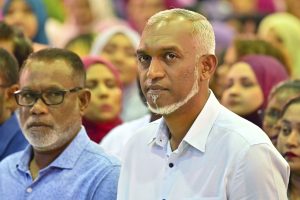Maldives elected a new president on September 30, and it is not Ibrahim Solih, the incumbent. The opposition candidate, Mohamed Muizzu, received 54 percent of the vote against Solih’s 46 percent. With the change in leadership in Maldives, there will be some key realignments and the China-India competitive dynamics in South Asia will yet again be on full display.
Muizzu, from the Progressive Alliance – a coalition of the Progressive Party of Maldives (PPM) and the People’s National Congress (PNC) – is considered to be pro-China, and it is assumed that Maldives will soon have a pro-China shift in its foreign policy. Conversely, this is seen by some as an loss for India.
Solih, who will remain as caretaker president until November 17, belongs to the Maldivian Democratic Party (MDP). Solih considered India a friend and partner, assisting Malé across multiple areas, from defense and security to economic and broader development of the island nation. And for India, Maldives has been one of its critical maritime partners in the Indian Ocean Region. But precisely because of Maldives’ strategic location in the Indian Ocean, China has been vying for expanding its influence there. The presence of several international sea lines of communications (SLOCS) is an additional imperative for China’s aggressive push into the Indian Ocean as an active player.
The highlight of Muizzu’s campaign was the slogan “India Out,” a contrast to Solih’s foreign policy that took an “India First” approach. India, as part of its efforts to augment the maritime capability of Maldives, had given a fast patrol vessel along with a landing craft assault ship to the Maldivian National Defense Forces (MNDF). Over the past decade, India has given several other defense items, including two helicopters and a small aircraft. Additionally, there were around 75 Indian military personnel in Maldives to operate and maintain the Indian aircraft. This in fact led to the opposition parties coming out with the “India Out” campaign, demanding that Indian military personnel leave the country.
India has also been extending support to the MNDF Coast Guard Fleet. India’s External Affairs Minister S. Jaishankar, who was in Maldives in February this year, signed an agreement that would see India fund Maldives’ development of a vessel repair and maintenance facility. Jaishankar later tweeted that the deal “will strengthen Maldivian Coast Guard capability and facilitate regional HADR [humanitarian assistance and disaster relief] efforts. Partners in development, partners in security.” The Maldivian defense minister was appreciate of this and tweeted, “The Coast Guard Harbor & Dockyard at SIFAVARU will mark another significant milestone.”
In recent times, however, Maldivian foreign policy has become a partisan domestic political issue, with parties and opinion favoring either leaning toward China or India. The pro-China leaning in Maldivian foreign policy began under President Abdullah Yameen Gayoom, who was in office from 2013 to 2018. In fact, in December 2017, during Yameen’s visit to China, Maldives agreed to join China’s Belt and Road Initiative (BRI). Both Yameen and Chinese President Xi Jinping said all the right things and the bilateral ties have been cemented since then, with Yameen saying that Malé views Beijing as “amongst our closest friends, most trusted and most dependable partners.” He added that it was Xi’s visit to the island nation in 2014 that elevated the bilateral ties and welcomed China’s continuing support for Maldives.
For China, the importance of Maldives comes from its location in the Indian Ocean, an area in which China has been keen on expanding its presence and influence. Maldives under Yameen offered a perfect opportunity. Since joining the BRI, Maldives has reportedly borrowed hundreds of millions of dollars from China. In 2018, when Yameen was defeated and the MDP came to power, Mohamed Nasheed, then speaker of Parliament said that the Chinese debt stood at $3.1 billion. He said that China had inflated the costs of the projects, thus making the money owed to China far greater on paper than what Maldives had actually received. Former Maldivian government officials and Chinese representatives corrected the figure to say that Maldives owes China somewhere between $1.1 billion and $1.4 billion.
Following the 2018 elections, Solih came to power and made rebuilding strong relations with India a priority. Both countries have tried to align their respective policies of SAGAR (Security and Growth for All in the Region), India’s “Neighborhood First” approach, and Maldives’ “India First” approach. During Prime Minister Narendra Modi’s visit to Maldives in June 2019, Solih reiterated his government’s “India First” approach and “pledged his government’s full support towards deepening the multifaceted, mutually beneficial partnership between India and the Maldives, which has traditionally been characterized by trust, transparency, mutual understanding and sensitivity.”
With these as the underlying principles driving the relationship, India and Maldives have expanded as well as deepened their engagements. On the defense side, the Indian Defense Minister Rajnath Singh was in Malé where he met the defense minister as well as the foreign minister. The focus of his discussions with the two ministers was on enhancing defense and security as well as respect for international law and rules-based order. The ministers also talked about their infrastructure and connectivity partnership. India has been engaged in a series of infrastructure and connectivity projects as well, including the Greater Malé Connectivity Project (GMCP).
Given India’s traditional pre-eminent position in Maldives, it is likely that Malé will remain somewhat sensitive to India’s broad strategic concerns around China, but it will likely push also for closer ties to Beijing and further China’s infrastructure and connectivity projects in the country. Nevertheless, one is likely to see a continuation of the China-India political competition in Maldives, as it has been in the rest of the Indian neighborhood. In this instance, China may have taken a slight advantage, but Malé surely recognizes that it is also not in Maldives’ interest to put all its eggs in Beijing’s basket.

































